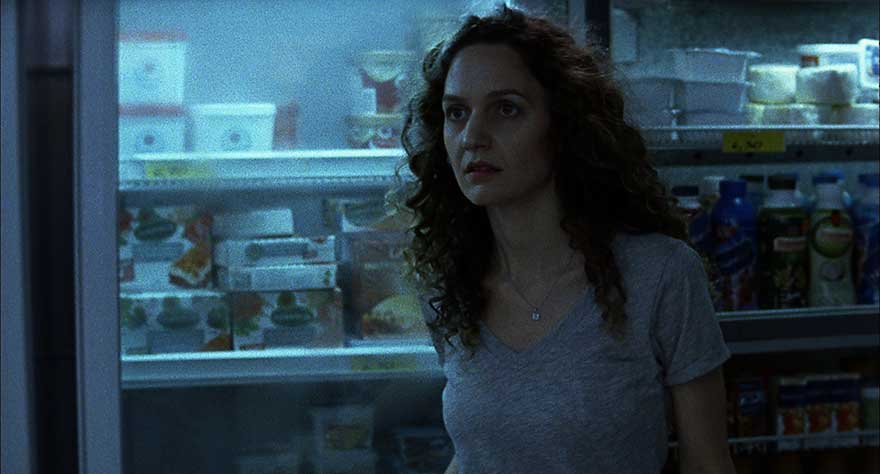
An entrepreneur faces challenges both financial and supernatural in this plodding socioeconomic drama/horror.

An entrepreneur faces challenges both financial and supernatural in this plodding socioeconomic drama/horror.
I know what it’s like to be laid off; it’s happened to me twice. Finding myself out of work not only forced me to face financial uncertainty, I had the added worry of wondering what the future would hold for my family. It can be harrowing. Such is the fate that faces the small family in Marco Dutra and Juliana Rojas’ Hard Labor. But rather than buckle down, the couple instead doubles down, with unexpected results.
Helena (Helena Albergaria) is about to take a big step in her life; she’s ready to rent a storefront and open her own market. When she gets home from closing the deal, she finds her husband Otávio (Marat Descartes) home early from his office job. He isn’t just home early, though—he’s home for good, having been let go by his company. This doesn’t dissuade him from supporting his wife’s endeavor, however. With his help (in between humiliating job interviews), and with their new live-in maid Paula (Naloana Lima) caring for their young daughter, Helena works hard to get her business launched. Like any other small-business owner, she faces challenges that include things like inventory worries, small repairs, and staff management; unlike any other small-business owner, she finds herself facing another challenge—one more supernatural in nature—making the harrowing a little more horrifying.
Hard Labor presents itself as having a blend of drama and horror. While the latter might be a cause for concern for the characters in the film, it certainly isn’t for the viewer. That the film has elements of horror is true only on the most technical of levels. Imagine having the ingredients for an omelet and putting those ingredients on the counter next to the stove, but not making an actual omelet. This is the horror portion of the film; items are present but never properly presented. There is never a sense of foreboding, no moments of anticipation, never a worry something bad will happen when least expected. There are ingredients—a vicious dog, mysterious scratches on a wall, unexplained broken glass, etc.—but they aren’t made into anything worth consuming. The horror is secondary, rendering it as nothing more than a dull distraction.
The film’s primary tale is, at least on the surface, a study of the effect of financial disparity within two unique socioeconomic circles, with Helena as the common ground. One circle is Helena’s house. In one day, roles reverse. Suddenly Helena, despite being a small business owner whose business has yet to open, becomes the breadwinner. This puts something of a strain on her marriage, although the film never takes the bait of relying on gimmicky tropes that trade on traditionally held gender-driven responsibilities. That’s not to say, though, that Otávio isn’t at least a little wounded. He is, but it isn’t played for melodrama.
Also in Helena’s house is Paula. Her employment status is considered “unregistered,” which is about the U.S. equivalent of working under the table. That might play okay for some workers here in the States, but in Brazil, being a registered employee is as much the goal as being employed is. (There’s even a line late in the film that equates being registered with existing as a person.) So, in Helena’s house is the troubled white collar of Otávio, the troubled blue collar (no collar?) of Paula, and the hard-working gray collar of the self-employed matriarch.
The other circle Helena exists in is her business. All the collars there are the same, but there is a clear hierarchy as well as a clear economic divide (as evidenced by an event that should not be spoiled). There’s even a reminder of society’s greater economic concern, as represented by a brief exchange between Helena and a customer when that customer complains about the price of a given item.
These differences—both between and within Helena’s circles—are all exercises in posturing for the deeper story of entitlement Hard Labor tries to tell. There are actions taken by every character, from Helena to the store clerk, that suggest each character thinks of themselves as being entitled to something. The most obvious example is Helena continuing with her business launch (with Otávio’s support) despite the absence of any other steady household income, but other smaller examples fill the story too. And because everyone operates at different economic levels (in both circles), that “something” that everyone thinks they’re entitled to exists on different levels as well.
It’s all very weighty, and while it takes place in another part of the world, the themes are such that they can resonate with any North American of employment age. It’s a shame it’s all presented in the dullest of terms. Like the horror portions of the film, the dramatic portions (read: the rest of the film) are not only devoid of melodrama, they’re devoid of any drama whatsoever, and presented mostly without emotion. It’s Brazilian neorealism at its least interesting, and watching it is akin to watching complete strangers trudge on with the tedium of their lives.
This makes the dullness of the horror aspects that much more frustrating, because at least a few good scares would have injected some energy into the film. With so much to say but lacking an interesting voice with which to say it, Hard Labor is more than just the film’s title; it’s also the film’s viewing experience.
Hard Labor will stream on Fandor and come out in select theaters on Friday, October 30.